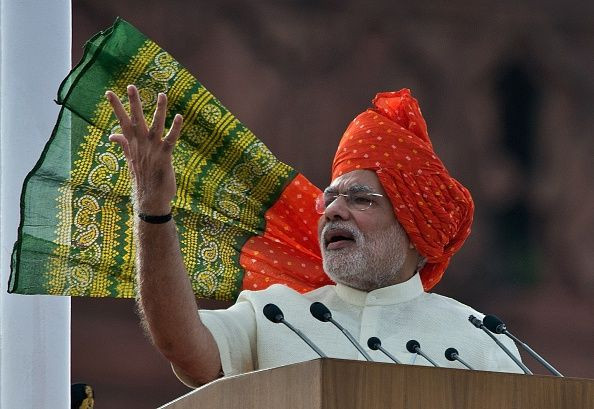India’s Narendra Modi Announces $1.5B Fund, Tax Breaks For Startups

Indian Prime Minister Narendra Modi announced Saturday a 100 billion rupee ($1.5 billion) fund and a three-year tax break among a slew of measures to encourage the country’s startups. Modi unveiled the 19-point action plan at the launch of the "Start-up India" program — a day-long event attended by hundreds of young entrepreneurs in the Indian capital city, Delhi.
Stressing the need for minimum interference from government, Modi also promised to speed up the process of getting compliance requirements for Indian startups and said the government would introduce an app that would allow entrepreneurs get approval to set up a company within a day.
"The government should not interfere in startups. We have done a lot for 70 years. Where have we reached? Please tell us what not to do,” Modi said in his one-hour address, which was attended by prominent Indian entrepreneurs as well as Uber founder Travis Kalanick and billionaire Masayoshi Son, the founder of Japan’s SoftBank Group.
Modi had spoken about launching the "Start-up India" program in his Independence Day address last year, with the goal to create more jobs amid a slowdown in the traditional brick-and-mortar economy. However, Saturday’s plan marked the first time the Indian government released a set of policies directly aimed at promoting startups and entrepreneurship.
Local success stories such as Flipkart, Snapdeal, Zomato and ride-hailing app Ola have underscored the need to nurture domestic talent and indigenous technologies in the country widely known for providing cheap engineering talent to power back-office operations for many multinational companies.
Modi also announced an 80 percent rebate on patent applications Saturday, so that startups can benefit from cheaper and faster processes. Moreover, they will be exempt from income tax for the first three profit-making years, Modi announced, sparking a loud applause from the audience.
The prime minister urged investors and entrepreneurs to look past the information technology sector and create companies that solve India’s problems. "Startup does not mean a billion dollar company where thousands of people work. It is about employing even five people, and developing India," he said, speaking in Hindi. Registered startups in the technology space have increased exponentially in the past five years from 501 in 2010 to over 4,500 in 2015.
With a surge in the number of startup businesses in the country, billions of dollars have been raised from foreign investors such as Softbank, Sequoia Capital and Tiger Global. Currently, Indian entrepreneurs depend on overseas investors for about 90 percent of their funding. The government hopes the $1.5 billion fund would partly ease the funding crunch along with a credit guarantee program to help protect venture funds from bad debts.
Modi also spoke about ensuring a faster exit arrangement for startups that want to close their businesses. He said businesses would be able to wind up within 90 days, through a provision made in the Bankruptcy and Insolvency Bill that is currently in Parliament.
Government procurement norms may also be relaxed to ensure that startups are able to participate and compete with other established businesses. The requirements for minimum turnovers and minimum operating years would be brought down so that startups can sell products to the government — the largest buyer of goods and services in Asia's third-largest economy. Modi, however, said that there would not be any compromise with quality. “The zero-effect, zero-defect formula will still apply,” he said.
Earlier in the day, speaking at the same event, Indian Finance Minister Arun Jaitley said the government was ready with an “entrepreneur-friendly taxation regime.”
© Copyright IBTimes 2025. All rights reserved.





















